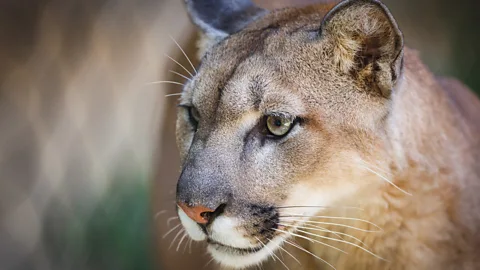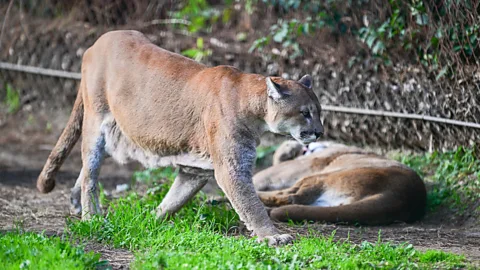Park rangers warn that best practices when encountering a mountain lion are wildly different from those for brown bears
 Getty Images
Getty ImagesWhat to do if you encounter a mountain lion – and how the protocol differs from that of other wildlife.
A recent mountain lion attack in California has left one hunter dead and another seriously injured. According to an El Dorado County Sheriff's Office statement, a teen called authorities early Saturday morning to report he and his 21-year-old brother were attacked while antler shed hunting.
Authorities arrived on the scene and located the injured 18-year-old before finding the older brother, who was on the ground near the mountain lion. The Sherrif's Office reports their deputies shot in the air to scare away the mountain lion and rushed in to administer medical aid. However, they found the young man had succumbed to his injuries.
Attacks by mountain lions (also called pumas, panthers or cougars, depending on location) are rare. Still, this is the second frightening incident involving the animal to make headlines in the US in recent weeks. On 17 February, five friends fought off a cougar in Washington State: The friends were biking on the Tokul Creek trail system near Fall City, northwest of Snoqualmie in the foothills of the Cascade Mountains when the animal attacked a 60-year-old woman in the group. Working together, the bikers were able to pin the mountain lion to the ground with a bike until help arrived. Thankfully, the woman survived.
A fatal cougar attack in the area has not taken place since 2018. And the last time a mountain lion killed a person in California was two decades ago, when a 35-year-old man was mauled in Whiting Ranch Regional Park in Orange County. Since 1890, there have been fewer than 50 mountain lion attacks on humans in California – six of which were fatal.
A slow climb in mountain lion attacks
However, there has been a steady uptick in animal attacks on humans in recent years. A study published in 2023 in the peer-reviewed journal PLOS Biology found that carnivore attacks have increased since the 1950s, with Africa and Asia having the sharpest upturns. Part of the reason for that is a reduction in natural habitat due to global warming. At the same time, humans are encroaching more and more into areas that were once solely occupied by wildlife as the population increases.
 Getty Images
Getty ImagesBiologist and wildlife educator Isabel McClelland has cared for African animals as a keeper at the Maryland Zoo, curated science education programs at schools in Ghana, and studied wildlife in the Amazon rainforest of Peru. She says that carnivores don't want anything to do with humans and actually make efforts to stay away from them. "That's why attacks don't happen often," she says. With that in mind, carnivores, including mountain lions, that have historically had little exposure to people are likely to be fearful when they do encounter them. "They were there first, and they're protecting their territory," McClelland explains.
McClelland says that in addition to issues such as overpopulation, there's also been an uptick in the number of travellers – including hikers, bikers and hunters – exploring national parks and other natural spaces. Therefore, she says efforts to make coexisting more "respectful and harmonious" are becoming more necessary. And by "efforts", she largely means education.
What humans should do if encountering a mountain lion
There isn't a one-size-fits-all approach for dealing with wild animals. But Dr. Rae Wynn-Grant, Wildlife Ecologist and Co-host of Mutual of Omaha’s Wild Kingdom Protecting the Wild, says you can come prepared. "I recommend familiarizing yourself with mountain lion behavior and habitats if you live or plan to visit areas where they are present and keep all your senses alert," she says. She also advises carrying sticks or noisemakers "so as not to startle an animal and to give them ample time to move away from you".
Keith Bensen, a wildlife biologist at the National Parks Service, says that avoiding hiking solo is good advice to abide by in the great outdoors, as well.
Still, some protocols differ from carnivore to carnivore. Typically, a mountain lion will immediately flee when it hears or spots a human, Bensen says. If it doesn't, your best bet is to be as intimidating as possible.
"We recommend facing the lion, making yourself tall, shouting, waving arms and generally making yourself appear obvious," he explains. "Then back away while facing the animal, slowly, making noise and waving your arms or clothing the whole time." He says the animal attacking would be "extraordinarily rare" but if it does, "fighting back as hard as possible" is your best hope.
More like this:
• Meet Florida's python bounty hunters
The recommendation is important to remember, especially because it's the exact same advice you should follow when encountering a black bear, Bensen says. But, notably, it's not the same for every bear species.
While some brown bear (grizzly) species are extinct, the North American Grizzly can still be found – in many parts of North America (mostly in Alaska, Montana, Idaho, Wyoming, Washington and Canada). Brown bears aren't as easily intimidated as black bears, so you shouldn't try to frighten them, and you shouldn't run away, according to the Interagency Grizzly Bear Committee, a Montana organisation dedicated to grizzly bear recovery and conservation. Instead, do your best to stay calm and back away slowly. If the bear attacks, don't fight back – just play dead.
Animal attacks do happen, but experts worry about the spread of misinformation. McClelland says that when we see animal attacks in the news, it can be easy to assume that carnivores, including mountain lions, are vicious, aggressive creatures by nature, when that's simply not the case. Really, they just want their space to be respected, and it behoves humans to take note of that.
--
If you liked this story, sign up for The Essential List newsletter – a handpicked selection of features, videos and can't-miss news delivered to your inbox every Friday.
